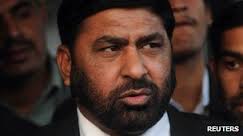 MULTAN, Pakistan, May 3 — Gunmen on Friday killed a Pakistani prosecutor who had been investigating the murder of former Prime Minister Benazir Bhutto and the 2008 Mumbai attacks.
MULTAN, Pakistan, May 3 — Gunmen on Friday killed a Pakistani prosecutor who had been investigating the murder of former Prime Minister Benazir Bhutto and the 2008 Mumbai attacks.
Assailants opened fire on the prosecutor, Chaudhry Zulfikar Ali, as he drove to work from his home in a suburb of the capital, Islamabad, for a court hearing in which the former military leader, Pervez Musharraf, faces charges in relation to Ms. Bhutto’s death in 2007.
The police said that gunmen traveling by motorbike and in a taxi sprayed Mr. Ali’s car with bullets, lightly wounding his bodyguard and killing a woman who was passing by when his car veered out of control. Television footage from the scene showed a bullet-riddled vehicle crashed by the roadside.
Mr. Ali died before he reached a hospital in Islamabad, where a doctor said he had been shot 13 times. The police said that Mr. Ali’s bodyguard returned fire and managed to wound one of the attackers. The police are searching for the attackers, all of whom escaped.
There was no immediate claim of responsibility for the attack, and the police said it was too early to comment on a possible motive. But few doubted that it was linked to Mr. Ali’s work as a state prosecutor in some of the most sensitive cases in the country, and his death reinforced the vulnerability of senior government officials who challenge Islamist militants and other powerful interests.
Mr. Ali represented the Federal Investigation Agency, which has implicated Mr. Musharraf in the death of Ms. Bhutto, who was assassinated in December 2007, just before the last election.
After the previous hearing in the Bhutto case on April 30, Mr. Ali told reporters he had “solid evidence” that connected Mr. Musharraf with Ms. Bhutto’s death.
Prosecutors and Bhutto supporters accuse Mr. Musharraf of failing to provide adequate security to Ms. Bhutto after her return from exile in October 2007. Mr. Musharraf has denied those accusations.
Since Mr. Musharraf’s return from exile in March, investigators have questioned him about the security arrangements for Ms. Bhutto in 2007. He insisted that, as head of state, he was not involved in administrative matters such as security arrangements.
Mr. Ali was also involved in another sensitive case: the trial of seven people from the militant group Lashkar-e-Taiba charged with involvement in the attacks in Mumbai, India, in November 2008, which killed more than 160 people.
Seven Lashkar activists have been on trial since 2009, accused of orchestrating the slaughter from Pakistan, and one of the defendants is the group’s operational leader, Zaki ur-Rehman Lakhvi. But the hearings have been characterized by opacity and a lethargic pace.
The trial is taking place at Adila jail in Rawalpindi, ostensibly on security grounds, and the news media are barred from proceedings. Hearings have been repeatedly adjourned because of the absence of lawyers or the presiding judge.
Currently, defense lawyers are cross-examining the prosecution witnesses. Mr. Ali was scheduled to appear in court on Saturday in relation to the case.
Lashkar-e-Taiba was founded with help from the Inter-Services Intelligence Directorate, Pakistan’s spy agency, in the 1990s, and its presumed leader, Hafiz Muhammad Saeed, lives openly in the eastern city of Lahore. The spy agency says it has cut all links with the group.
Mr. Ali’s death comes at a sensitive time, with Pakistanis scheduled to go to the polls for a general election on May 11. Campaigning has been marred by widespread Taliban violence against candidates from secular parties.
In the latest attack, gunmen shot dead a candidate from the secular Awami National Party, which has borne the brunt of attacks, along with his 6-year-old son, in the port city of Karachi on Friday.
Although Islamabad suffered a number of militant attacks in 2008 and 2009, it has escaped major violence in recent years. But several prominent figures have been assassinated on its streets, including the former governor of Punjab Province, Salman Taseeer, and a minister for religious affairs.
Mir Hazar Khan Khoso, the interim prime minister, addressed the nation Friday evening and reiterated his government’s resolve to hold free, fair, transparent and peaceful elections, and he said a special security cell had been established in the Interior Ministry to coordinate with the national election commission.
“This cell will collect intelligence reports and share it with provincial government and law enforcing agencies, and this cell is also empowered to take decisions for timely action if needed,” Mr. Khoso said. “All resources will be used to improve security of the sensitive polling stations and their effective monitoring,” he added.
Mr. Musharraf returned from exile with a plan to run for Parliament in a general election. He faces charges in several cases related to his time in power, including the murder of Ms. Bhutto, the killing of a Baloch nationalist leader, and the firing of senior judges.
Mr. Musharraf, a retired general, has been disqualified from contesting the election, and this week a court banned him from politics for life. He also faces possible treason charges.
In the court hearing in nearby Rawalpindi, lawyers for Mr. Musharraf argued that he should be exempted from appearing in person in the case, Pakistani television stations reported. The hearing was adjourned until May 14.
Salman Masood contributed reporting from Islamabad, Pakistan.
